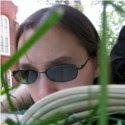In the first place, of course, not only am I studying fanfiction and the space in which it exists (fandom is an integral part of fanfiction, naturally, since the latter can't really exist without the former), I'm also studying myself and my experiences. That...makes it just a little difficult, given that I'm then analyzing myself, a subject I can't approach with any degree of objectivity. That seems to be part of the point of an autoethnography, if Ellis and Bochner's "Analyzing Analytic Autoethnography: An Autopsy" is any indication, and my closeness with my own work and the connections I've made with others through fandom makes some analytical objectivity even harder to achieve. I can look at certain parts of fandom in sometimes tolerant or alarmed amusement (or just plain alarm with a side of disgust, when it comes to the inordinately large amount of crazy in the Twilight fandom...), but I can't be detached.
That, more than anything else, makes my project different from the normal in studies of fanfiction, and it's my biggest reason for wanting to continue this project in one way or another: the vast majority of academic views of fanfiction come from an outsider's perspective, rarely looking at the value the community itself places on certain aspects of fanfiction, at what is and is not valued in the community, what practices are applauded and derided and why, what quality fanfiction looks like and who writes and reads it. Articles from an insider perspective do exist, but they tend to be short pieces written for a popular audience rather than in-depth studies of the fanfiction community and its practices, which means that such in-depth studies tend to misrepresent or ignore aspects of that community. Black's article on English language learners, for instance, fails to situate the fanfic she studies in a larger context, in that the conventions of fanfiction.net and the anime fandom have some distinct differences from other parts of fandom--some of the author's practices are actually frowned upon within fandom, and her writing itself is fairly mediocre, compared to publication-quality work produced by some fanwriters. It's still better than average, however, particularly compared to others in her age group, and the fact that she's highly receptive to critical feedback is itself unusual, two pertinent facts that Black seems to overlook. That sense of widespread fan practices and conventions would help set apart an insider perspective from an outsider's.
Some existing studies do take a somewhat more critical approach, pointing out some of the downfalls to fanfiction without condemning it across the board, but there's still a lack of this sort of study. Pointing out that fanfiction should be held to the same standards as original writing and listing some of the pitfalls of bad fanfiction is one thing, but the majority of fanwriters just don't care enough to get a beta reader to "help budding writers avoid these embarrassing gaffs," and only an insider perspective will tell you what is and isn't typical in the fanwriting community. The practice of beta reading would itself be an interesting focus of study, as would the practice of "sporking" bad fanfic (mocking them in the manner of Mystery Science Theater 3000, essentially), but these practices aren't likely to be on the radar of a community outsider.
Expanding on fanfiction studies from an insider's perspective could help open this field up to more exploration from those who already have a stake in it, which would be valuable in and of itself--rather than speculating on why certain groups write certain kinds of fanfic, those writers themselves could enter the academic arena to examine the practices of their own community. Dismantling misconceptions, it seems to me, is always worthwhile.
Subscribe to:
Post Comments (Atom)

No comments:
Post a Comment